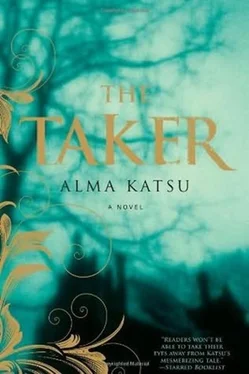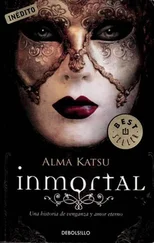He’s going to help her. He has to. He thinks he’s uniquely equipped for this situation. With his training (“Mrs. Parker? We did everything we could for your son, but I’m afraid…”) he hopes her sorrow will shed off him like water off Teflon.
She’s eased up on her crying and is rubbing her eyes with the back of her hand.
“Better?” Luke asks, lifting her chin. “Want to go out and get some air?” She nods.
Within fifteen minutes they’re walking hand in hand into the dusky horizon. Lanny has scrubbed her face clean. She leans into Luke’s arm like a girl in love, but on her face is the saddest smile the world has ever seen.
“How about a drink?” he asks. They step off the street into a dark bar and he orders scotch neat for both of them. “I’ll be able to drink you under the table,” she warns him and they clink glasses as though they are celebrating. And sure enough, after one shot, Luke feels the warmth that comes at the beginning of drunkenness, but Lanny has had three shots and has only a half-tipsy smile.
“There’s something I want to ask you. It’s about-him,” he says, as though by not speaking the name, the question will hurt less. “After everything he put you through, how could you keep loving him? It doesn’t sound like he deserved you…”
She picks up her empty shot glass by the rim, like a chess piece. “I could make all kinds of excuses, like how that’s the way it was back then, that wives expected their men to fool around. Or that it was just the kind of man Jonathan was and I had to accept it. But that’s not the real reason… I don’t know how to explain it. I’ve always wanted him to love me the way I loved him. He did love me, I know he did. Just not the way I wanted him to.
“And it’s not so different for a lot of people I’ve known. One partner doesn’t love the other enough to stop drinking, or gambling, or running around with other women. One is the giver and one is the taker. The giver wishes the taker would stop.”
“But the taker never changes,” Luke says, though he wonders if this is always the case.
“Sometimes the giver has to let go, but sometimes you don’t. You can’t. I couldn’t give up on Jonathan. I seemed to be able to forgive him anything.”
Luke sees the ocean well up in her eyes and tries to distract her. “What about Adair? From what you’ve said, it seems that he could have been in love with you…?”
“His love is like the love fire has for wood.” She laughs ruefully. “He confused me for a while, I’ll give you that. One minute he was charming me, the next minute he’d humiliate me. It was all games and tricks with him. I think… he just wanted to see if he could make me love him. Because, I think, no one had ever loved him.” She becomes still, hands knotted in her lap, and the glassy surface of her eyes ruptures. “Look what you’ve done… I’m going to start crying again. I don’t want to cry in public. I don’t want to embarrass you. Let’s go back to the hotel room. We can smoke some pot.”
Luke’s face lights up, remembering the big plastic bag, the resinous high. “I’m prepared to smoke that entire bag with you, if that’s what it takes to cheer you up.”
“My hero,” she says as she tucks her arm under his. They weave up the street toward the hotel, a brisk wind slapping their faces. Luke wishes he could give Lanny a shot of morphine to dull her pain. He’d give her a tranquilizer injection to bring her peace daily, if he could. He clears his mind with a shake of his head. He feels like he’d do anything to make her happy again, but he doesn’t want to become the valet to her misery.
“What was it about me… will you tell me the truth? Am I unworthy of being loved?” she blurts out once they are in bed.
Her question takes Luke aback. “I can’t tell you why Jonathan didn’t love you back, but for what it’s worth, I think he made a huge mistake.” Jonathan was an idiot; only a fool would squander such devotion, Luke thinks.
Her look at him is disbelieving, but she smiles. And then she falls asleep. He pulls her against him, wrapping his arms around her sylphlike body, gathering up her elegantly splayed limbs. He can’t recall feeling like this, except for that miserable time in the pizza parlor with his daughters, when he wanted to bundle them into his rental car and take them back to Maine. He knows he made the right choice by not giving in to his sadness then-the girls are better off with their mother-but he will be haunted forever by the act of driving away from them. Only a fool squanders such love.
And Lanny. He is willing to do anything to protect this vulnerable woman, to fix her. He wishes he could draw the poison out of her, like a leech with blood. He would take it on himself if he could, but knows all he can do is be with her.

BOSTON, 1819
An ashy light tugged at my eyelids, waking me from sleep one evening. Uzra appeared next to my bed, a small oil lamp swaying in her hand. It must have been very late, for Adair’s house was still as a crypt. Her eyes implored me to get out of bed, so I did.
She glided out of the room in her usual silent way, leaving me to follow behind her. The sound of my slippered feet on the carpets was scarcely a whisper, but in that quiet house, the sound echoed down the halls. Uzra shielded the lamp as we walked past the other bedchambers so we threw as little light as possible, and we were undiscovered by the time we reached the stairs to the attic.
The attic was divided into two sections, one made into the servants’ quarters and a smaller, unfinished space for storage. This was the area where Uzra hid. She led me through a maze of trunks that acted as her barrier against the world, and then down an impossibly narrow corridor to a diminutive door. We had to crouch and twist to fit through the door and emerged inside what looked like a whale’s belly: rafters for the ribs, a brick chimney instead of a windpipe. Moon-light seeped in from uncovered windows, allowing views onto the unadorned path to the carriage house. She chose to live in this hollow space to get away from Adair. It was a sad place to live, too hot in the summer and too cold in the winter, and lonely as the moon.
We passed what I assumed was her nest, curtained off by the iridescent winding sheets of organza she wore as sarongs, hung from the rafters like laundry on a line. The bed itself was made of two blankets from the parlor, twisted together in a circular pattern, not unlike a bed made by a wild animal, frenzied and makeshift. A heap of trinkets was piled next to the bed, diamonds the size of grapes, a veil of thin gold mesh to wear with a chador. But there was also bric-a-brac, things a child might covet: a cold, lovely dagger, a memento from her birthplace, its serpentine blade like a snake in motion; a bronze hand mirror.
She brought me to a wall, a dead end. Where I saw nothing, though, she dropped to her knees and pried a pair of boards away, revealing a crawl space. Taking the oil lamp, she plunged fearlessly into the darkness like a rat used to tunneling between walls. I took a deep breath and followed.
After traveling on hands and knees for about twenty feet, we emerged in a windowless room. Uzra held up the lamp so I could see where we were: it was a small finished space, part of the servants’ suite, with a tiny fireplace and a door. I went to the door and tried it, but it was held fast by some means on the outside. The room was dominated by a large table covered with bottles and jars and an array of odds and ends. There was a hutch, and it, too, was stocked with containers of all sizes and shapes, most covered with waxed cloth or stoppered with cork. Baskets tucked under the table were filled with everything from pinecones and branches to inscrutable parts of various animals’ bodies. A few books, ancient and crumbly, were tucked between the jars. Candles stood on plates on the edge of the table.
Читать дальше













